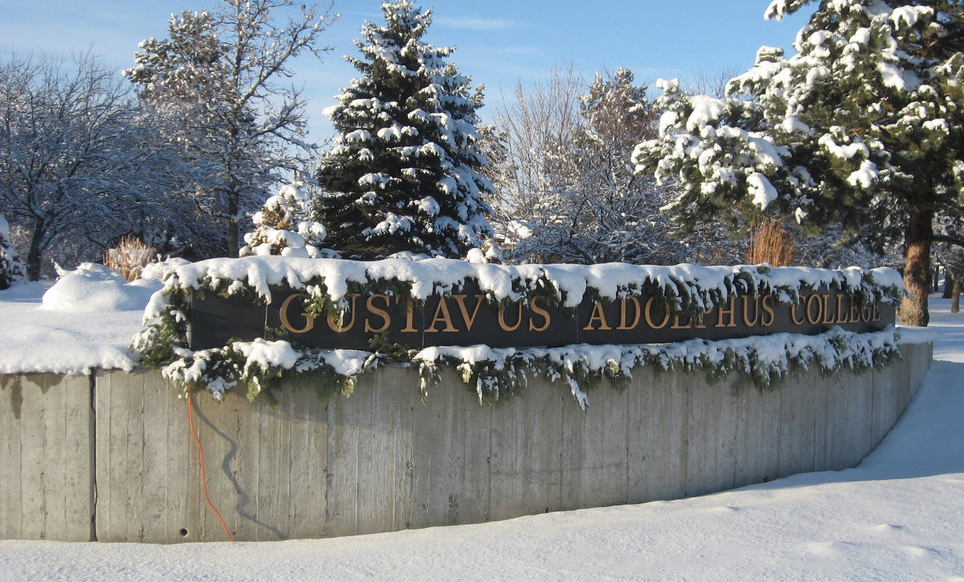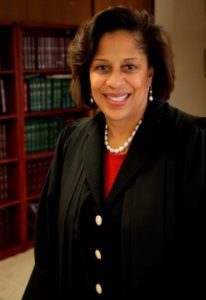
Hennepin County District Judge Tanya Bransford ‘80 will return to her alma mater to deliver a lecture at Gustavus Adolphus College on March 16 from 7 to 8:30 p.m. in the Wallenberg Auditorium. As the speaker for the 2017 Christenson Lectureship in Politics and Law, Bransford will examine the effect of implicit bias, address the increase in bias-motivated incidents, and offer strategies to challenge acts of explicit bias and confront our own unconscious biases. Hosted by the Department of Political Science, the event is free and open to the public.
“Her extensive experience in the Minnesota criminal justice system gives Judge Bransford unique insight into how questions of bias relate to criminal cases but also to society in general,” said political science professor and faculty host Chris Gilbert. “This is an especially opportune point in time for us to consider bias incidents and to understand how our own unconscious biases influence our decisions and behavior.”
In advance of her visit, Judge Bransford answered a few questions.
Gustavus: How does implicit bias affect our everyday decisions and behavior?
Judge Bransford: As humans, we only use a portion of our brains in conscious thought. Our brains control activities such as our breathing, vision, hearing and many other things without us thinking about it. It only comes to our conscious brain if there is a problem. We do the same thing for objects, people and groups of people. When we see a person, we subconsciously assign some characteristics to that person that are based on our experiences, including what we have heard other people say or images that we have seen in the media. Implicit biases are basically unconscious stereotypes that we have about a group of people. Implicit bias affects our daily behavior when we make decisions or judgements based upon the implicit bias. Affinity bias is our preference to associate with people that are like ourselves. This bias comes into play in hiring decisions and maybe for college students, decisions like who to choose for student government or who to choose as a member of a sorority or fraternity.
Gustavus: What has contributed to the increase in bias-motivated incidents throughout our country?
Judge Bransford: I believe that the increase in bias-motivated incidents throughout our country is a result of several factors. One factor is the backlash from having a Black president. There were numerous incidents where President Obama and First Lady Michelle Obama were disrespected apparently due to their race, including the questions about whether he was born in the United States. Instead of a “post-racial society” after Obama, some people apparently felt that it was time to get white people back in power. I also think that the current president’s campaign, where he mocked a disabled person and said disparaging remarks about women and people of color, allowed people who shared those beliefs to become more vocal and act upon those beliefs.
I also believe that the anti-immigration rhetoric has also contributed to the increase in bias-motivated incidents in our country. I do not have a ready answer to the dramatic increase in anti-Semitic bias incidents around the country including bomb threats of Jewish community centers and widespread vandalism of Jewish cemeteries, except that the neo-Nazis who were always present on the fringe of our society now feel emboldened to come out from the shadows into the mainstream.
Gustavus: What can students and others do to address explicitly biased acts?
Judge Bransford: Students and others can and should confront examples of explicit bias when they occur. If you see someone being bullied or discriminated against, you can stand up for that person. You can also write letters, protest, and show different ways that you stand in solidarity with people who are victims of discrimination. The people in the Muslim community who publicly supporting the Jewish people after the vandalism of the Jewish cemeteries are a perfect example of this. We have various areas that are publically declared as free of guns, smoke, and peanuts. In a similar method, we can declare bias free zones, as well, in your dorms, your organizations, and your school.
Gustavus: Reflecting on your own Gustavus experience, how did it prepare you for your path and current position as a District Court Judge?
Judge Bransford: When I was a student at Gustavus, I was interested in pursuing a career in law or journalism. I worked with the school newspaper and took pre-law, business law, and constitutional law classes from Professor Ron Christensen and other excellent professors. The various classes prepared me to be a good writer and critical thinker, which are traits that I use every day as a District Court Judge. I also developed leadership skills by serving as the President of the Black Student Organization and as a member of the Guild of St. Lucia. One of my favorite classes was a course on Comparative Religions. It taught me that many religions are based upon similar principles such as “do unto others as you would have them do unto you.” Similar basic principles of fairness guide me every day in life and at work.
For the Christensen Lecture’s inception in 2015, the political science department hosted David Cole, then a Georgetown University law professor and now the national legal director of the American Civil Liberties Union. Created and funded by Kathryn Christenson to honor the late Ron Christenson, both former Gustavus professors, the Christenson Lectureship seeks to connect the Gustavus and Saint Peter communities with speakers who can share their own perspectives on the intersection of politics and laws. Judge Bransford will continue this tradition by exploring bias in the court system as one of the major issues facing society today.
“Her life and career are yet another example of a Gustavus alum making her life count in so many meaningful ways, which is a great example to promote to our current students,” Gilbert said. “It is so wonderful to welcome back one of Ron’s former students to deliver this second lecture in honor of him and his work.”
###
Media Contact: Director of Media Relations and Internal Communication Luc Hatlestad
luch@gustavus.edu
507-933-7510
